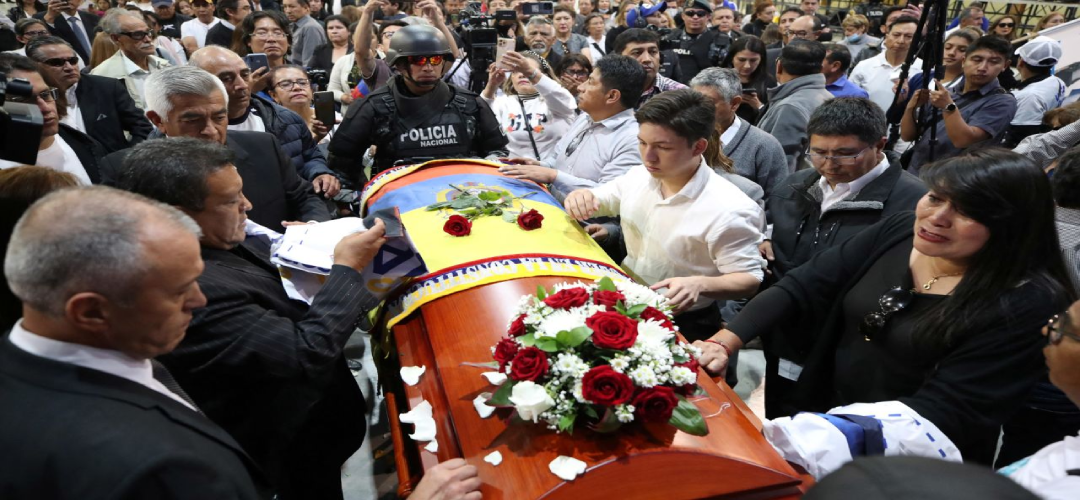Ecuador: Ruled by Gangs
August 19, 2023 | Expert Insights

The assassination of Ecuadorian presidential candidate Fernando Villavicencio on live TV on August 9, 2023, is a stark reminder of the dangers of gang wars and corruption in Latin America.
Villavicencio was a vocal critic of drug trafficking and corruption, and his death is a blow to efforts to fight these problems in Ecuador.
Background
Ecuador is no exception to this trend. There has been a wave of violence in Latin America, fuelled by drug trafficking and corruption. In Colombia, Mexico, and other countries, drug cartels have become increasingly powerful and have infiltrated governments and security forces. This has led to a cycle of violence, as cartels fight each other for control of territory and resources.
Villavicencio was a vocal critic of drug trafficking and corruption. He had made many enemies in his time, and his assassination was likely a warning to others who dared to speak out against the criminal elements that have taken over Ecuador.
Villavicencio's assassination is not an isolated incident. In recent years, the country has seen a surge in gang violence, as well as corruption scandals involving high-level officials. This has created a climate of impunity in which criminals operate with little fear of being brought to justice.
The assassination of Villavicencio is a wake-up call for Ecuador and for Latin America as a whole. It shows that the problem of gang violence and corruption is not going away anytime soon. If anything, it is getting worse. The region needs to take urgent action to address these problems, or they will continue destabilising countries and threatening democracy.

Analysis
Drug cartels have been operating in Latin America for decades, but their power and influence have grown significantly in recent years. This is due in part to the increasing demand for drugs in the United States and Europe. As the demand for drugs has grown, so too has the price, which has made drug trafficking even more lucrative-the immense profits encourage cartels to go to great risks.
Drug cartels have also become more sophisticated in their operations. They have developed complex networks that span the globe, and they use a variety of methods to transport drugs, including planes, submersibles, ultra-fast boats, and trucks. They also use violence and intimidation to protect their operations and to silence their critics.
As drug cartels have become more powerful, they have begun infiltrating governments and security forces in Latin America. This has given them a level of impunity that has allowed them to operate with little fear of being brought to justice. In some cases, drug cartels have even become the de facto rulers of certain regions. The rise of gang wars and corruption has had a devastating impact on Latin America. It has led to an increase in violence, crime, and poverty. It has also undermined democracy and the rule of law.
In some countries, gang wars have become so deadly that they have displaced millions. In Mexico, for example, an estimated 3 million people have been forced to flee their homes due to violence. This has created a humanitarian crisis, and it has made it difficult for governments to provide basic services to their citizens. Soon countries of Latin America will become another Haiti where gang violence is driving millions of citizens out of the country and even the UN is contemplating another round of peace enforcement.
Corruption has also had a corrosive effect on Latin America. It has eroded trust in government and institutions, making it difficult to attract foreign investment. This has slowed economic growth and made it harder for countries to improve the lives of their citizens.
The future of Latin America is uncertain. The region faces several challenges, including gang wars, corruption, and economic inequality. If these problems are not addressed, they could lead to further instability and violence. A few countries in Latin America are making progress in the fight against gang violence and corruption. In Colombia, for example, the government has made significant inroads in reducing violence and coca production. There is a growing movement in Mexico to demand accountability from corrupt officials.
Latin America's future will depend on its citizens' choices. If they unite to fight against gang violence and corruption, they can build a better future for themselves and their children. The assassination of Fernando Villavicencio is a tragedy for Ecuador and Latin America as a whole. It is a reminder of the dangers of gang wars and corruption. These problems are not going away anytime soon but can be addressed. It will take courage, determination, and cooperation, but building a better future for Latin America is possible.
Assessment
- Strengthen law enforcement and the judiciary. This includes providing law enforcement agencies with the resources to investigate and prosecute crimes and ensuring that the judiciary is independent and impartial.
- Implement social programs to address the root causes of gang violence, such as poverty, unemployment, and lack of education. Concurrently, promote transparency and accountability in government. This includes strengthening oversight mechanisms and ensuring government officials are accountable for their actions.
- Work with international partners to combat drug trafficking and organized crime. This includes sharing intelligence and cooperating on joint operations.








Comments